Jul 19, 2021
We are excited to introduce the three new Precious Blood Volunteers! Over the next few days you’ll get to meet Aaron, Raechel, and Vincent at preciousbloodvolunteers.org.
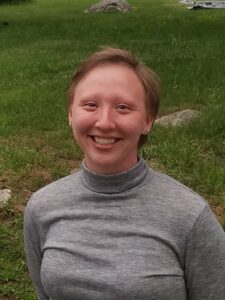
2021-2022 Precious Blood Volunteer, Raechel Kiesel
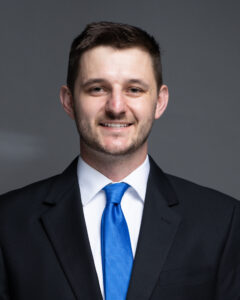
2021-2022 Precious Blood Volunteer, Vincent Tedford
Raechel Kiesel and Vincent Tedford will be serving at Precious Blood Ministry of Reconciliation in Chicago, Illinois. Raechel continues a tradition of University of Notre Dame alumni who have served with us. She comes from Indiana. Vincent graduated from Texas A&M University. He is the first graduate of Texas A&M to serve as a Precious Blood Volunteer, and our third volunteer from Texas.
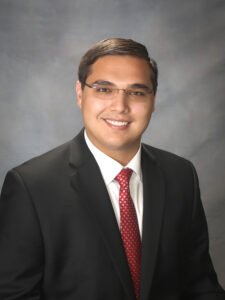
2021-2022 Precious Blood Volunteer, Aaron Wise
Aaron Wise will be serving at KC CARE Health Center in Kansas City, Missouri. Aaron is our first volunteer from Case Western Reserve University. He continues in a long line of volunteers from the great state of Ohio.
Three volunteers from our previous batch lived in intentional Catholic communities in Chicago and Kansas City. This worked out well providing them places to share common life with people their own age. We are continuing with this for the 2021-2022 volunteer year. Raechel and Vincent will be living at Hope House, which is part of Port Ministries, in the Back of the Yards neighborhood in Chicago. Aaron will be living in community at Jerusalem Farm in Kansas City, deepening the long-term relationship the Kansas City Province has had with Jerusalem Farm.
They will begin their service next week during Orientation. Orientation begins on Monday, July 26 at Precious Blood Renewal Center in Liberty, Missouri. Please keep our new volunteers in your prayers.
To learn more about how you can grow in your faith by walking with others go to preciousbloodvolunteers.org.
May 14, 2021
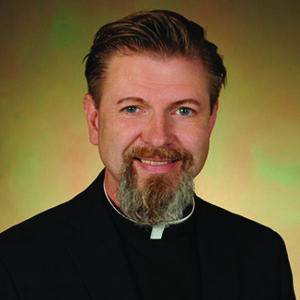
In addition to full-time teaching, Fr. Dan serves on four boards of not-for-profit orga-nizations in Joliet and the South Side of Chicago areas where he advocates for Mental Health and Minority Youth Opportunities.
by Fr. Daniel Torson, C.PP.S.
Academia finds itself asking many questions that are similar to those of big business: Can people continue to operate and work just as efficiently from home? Should meetings and conferences continue online? How much personal interaction is necessary to build a team or a sense of unity? One thing is certain: even as covid mitigations continue to loosen, operations will not return completely to pre-pandemic modes. The complete shutdown of one year ago will have lasting effects.
Two aspects have become clear over the past year from nearly all surveys and research: Traditional age college students do not like or prefer a completely online learning format, and similarly, most professors do not prefer a completely online learning format either. Both groups have come to realize the value of human interaction and that the building of relationships are essential to the learning process. In essence, both groups have grown in appreciation for the in-person learning process. But are both groups willing to give up the convenience of not commuting (or for resident students, walking across campus), not needing to look presentable in public, and truly exerting the energy to engage peers and faculty? For students, it has become much easier to simply crawl out of bed, tune into the class on the computer, and while class is commencing, check social media and take care of personal needs. The hope is that the important material will be picked up, or the student will watch the video recording of the class later. Faculty have perfected methods for online interaction over the course of the last year, but the results of the new methods are not always positive.
So, where does academia go from here? Here, I will be addressing Lewis University specifically, but having said that, I have observed that Lewis has positioned itself clearly in the mainstream of learn-ing and mitigation processes throughout the past year. Thus, for Fall 2021, Lewis will be offering more options with varied formats for both faculty and students. The direction from the Provost’s Office was that clearly there needs to be more in-person interaction with students, but varied formats will be welcomed. Thus, I was asked two months ago, “How do I want to teach in the Fall?”
That is a loaded question! I had been teaching hybrid for the past two semesters, which means that I am in-person with all my students for 50 minutes each week with the remainder online. While I clearly acknowledge that 50 minutes per week is not enough, there have been many successes in this format. My students have been forced to take responsibility for their learning, read the assignments (which in theology means reading excerpts from notable theologians such as Aquinas and Schleiermacher), synthesize, and integrate the readings. This has been accomplished and assessed through weekly student submissions of answers to my specified questions, writing short essays, writing discussion boards with references to the theologians, and essay Mid-terms and Final Exams. For the two exams, students can consult the sources and take as much time as they need, in order to produce coherent essays incorporating content, assessment, and application. My top students have produced some excellent and amazing essays, while at the same time, the middle-of-the-academic-spectrum students have been pushed further than they could have imagined! None of my students are theology majors, but they have truly engaged the discipline of theology!
In order to facilitate this process, I check email a half a dozen times a day, and I offered my cell phone number to students for texting and phone calls. My students do not like to call people, so the only time that we have a phone conversation is when we arrange a specific day and time. But they like to text! So, I frequently get texts to which I can almost im-mediately respond!
Since my social life during the past year has been extremely limited, I am at home most evenings cooking and watching sports on TV). So, a text is kind of fun, and I don’t get so many that they be-come burdensome.
As a result, I have decided to teach each of my four classes two days a week in the fall, with Friday as a reading and writing day. I am trying to blend the positives of pre-covid and covid strategies. As you would expect, written assignments due for most weeks entail more grading than was the case during pre-covid times. This will also be the third time that I have re-written my classes (syllabi and online course shells) over the past year. I am looking forward to the challenge, if I can get the results of theological engagement as I have experienced during the past year.
I have found over the past year that college students in general are very “needy.” I look into their eyes and see “burden” for many of them. In addition to their own mental health in dealing with the pandemic, many have family issues that are very troubling, and many are still working to support themselves. This is simply not the college environment that I grew up in many years ago. All I had to worry about was getting my studies finished and taking care of myself. The world seemed so carefree with endless possibilities before us back then! It is not the same today.
Academia has gone through numerous challenges over the past year, but we have adapted “on the fly” and still maintained a level of excellence in teaching/learning. Some questions about processes for the fall will be sorted out this summer, but others will remain influx. For certain is the fact that Academia will not completely return to pre-covid days, but the cooperative efforts of administrators, faculty, staff, and students will create a “new normal.” Change is not to be feared but rather embraced!
Apr 30, 2021
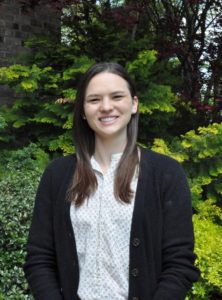
2020-2021 Precious Blood Volunteer, Allison Spraul
by Allison Spraul, Precious Blood Volunteer
I’ve known I have a call to become a physician for many years, and while the basic underlying facts that drive this calling have not changed—my love of biology and science, call to help and accompany others, and desire to build community—my understanding of what that role can look like has evolved, especially over this last year of service with Precious Blood Volunteers at KC CARE Health Center. I’ve been reflecting on leadership.
Doctors are leaders of healthcare teams, often leaders within clinics or hospitals, and can become leaders in their wider community outside of the healthcare system, a role emphasized by the pandemic of the past year. But leadership styles are as individualized as each person who is called upon to fill the role, and I have been thinking about what kind of leader I will become, influenced by my experiences with health care and formation in faith of the past year. I have been comparing the leadership qualities of Jesus Christ shown throughout the Gospels, and examples I have seen over the past eight months the healthcare providers I work with day in and day out. There are many qualities I have seen in these role models that I hope to incorporate as I grow into my own.
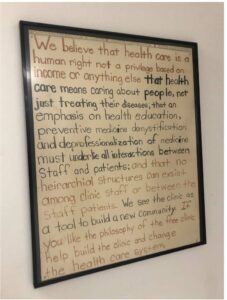 I want to be a leader whose actions and words align. To me, it speaks of authenticity and of true commitment, and it is easier to ask others to follow when you practice what you preach. I have seen providers I work with be vaccinated and share their personal experiences with patients, and lead healthy lives to model behaviors they encourage in patients. Jesus asks much from his followers, but he also healed the sick, dined with sinners, and eventually died on the cross, proving he is not merely the source of teachings on how to live as a child of God, but also the perfect example to follow for living a holy and moral life every day.
I want to be a leader whose actions and words align. To me, it speaks of authenticity and of true commitment, and it is easier to ask others to follow when you practice what you preach. I have seen providers I work with be vaccinated and share their personal experiences with patients, and lead healthy lives to model behaviors they encourage in patients. Jesus asks much from his followers, but he also healed the sick, dined with sinners, and eventually died on the cross, proving he is not merely the source of teachings on how to live as a child of God, but also the perfect example to follow for living a holy and moral life every day.
I want to be a leader who can call the best out of the others who work around me. I work with providers who I see give their best every day when taking care of patients, and that inspires and pushes me to give my best as well. These providers support me and others that we work with, answering questions and being encouraging leaders. Similarly, Jesus called qualities out of people that they did not previously know they possessed. He called fishermen and tax collectors to serve as his trusted apostles and expressed his belief in the ability of the overlooked—children, Gentiles, lepers—to serve as models of faith.
Perhaps most importantly, I want to be a leader with a “servant heart.” In the Gospel account we hear on Holy Thursday, Jesus humbles himself by putting himself in the position of a servant, washes the feet of his disciples, and then tells them, “I have given you a model to follow, so that as I have done for you, you should also do.” In a Bible full of metaphors, allegory, and poetic prose, this stands out as a stark example followed by a straightforward command.
This means that this is something to which we should pay close attention. I want to be a leader who seeks to benefit others and better their lives without seeking something in return, like the model Jesus puts forth in the Passover story. I can also see this in the providers at KC CARE. They see patients who the system overlooks, a medically complex population, when they could be better paid working elsewhere. They are leaders who do not put their own status or privilege first but center the good of their teams and those they serve.
I think that like many things in life, I will continue to explore what kind of physician and leader I want to be and grow into what that best looks like for me and my values. But this past year of service at KC CARE, and the reflection on my faith I’ve done has given me a solid foundation and incredible models to look up to in order to become a leader who is authentic, inspiring, and centered by a servant heart.
Allison is serving as a Precious Blood Volunteer at KC CARE Health Center in Kansas City, Missouri. Go to preciousbloodvolunteers.org to learn more about Precious Blood Volunteers.
Apr 21, 2021
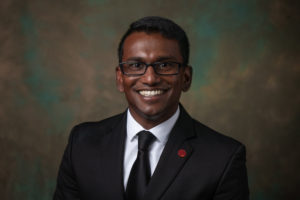
2020-2021 Volunteer, Mike Price
By Mike Price, Precious Blood Volunteer
On April 20, 2021, many people have been holding their breath for nearly a year since the murder of George Perry Floyd Jr. in Minneapolis, Minnesota on May 20, 2020. After today’s verdict, many people were able to exhale or even breathe for the first time.
Soon after I heard the verdict, I said this little prayer to myself: “We give thanks to the Lord for hearing the cry of your people for justice. We pray that racial & social justice continues to be in the hearts of all of your people as we work towards healing our broken world together. #BLM #EveryLifeMatters #HumanDignity #SocialJustice #RacialJustice.”
I believe that the Lord heard the cry of His people over the last year even though many more black women, men, and children have been murdered by those who are supposed to serve and protect all lives. The phrase “cry of the people” is familiar to many of us. We hear this in various forms all throughout the Bible; the cry of the poor (Proverbs 21:13, Job 34:28); He does not forget the cry of the afflicted (Psalm 9:12); and so on. Many people of color expected the verdict to be in favor of former Officer Derek Chauvin. I believe the Lord heard the cry of His people and touched the hearts of the jurors and the nation, which could be a catalyst for further movement in the right direction for racial and social justice. People of color have been plagued by injustice far too long, which has been very evident in the United States through various forms of media. People of color have been crying out to only have a breath that allows them to have a voice that speaks to the truth of injustice in the United States.
After former Officer Derek Chauvin was escorted out of the courtroom in handcuffs, the following statement made by Minnesota Attorney General Keith Ellison said, “I would not call today’s verdict justice, however, because justice implies true restoration. But it is accountability, which is the first step towards justice, and now the cause of justice is in your hands.”
That powerful statement that helped me to better understand the difference between justice and accountability. I have to admit, I have a bachelor’s degree in Catholic theology, and sadly up to this point in my life, I am not sure if I truly understood what justice meant until Attorney General Ellison used it in this context. No matter how many degrees one holds, one still must have real-world encounters and applications that can make the content applicable for true integration for oneself.
Former President Barack Obama said, “true justice requires that we come to terms with the fact that Black Americans are treated differently, every day. It requires us to recognize that millions of our friends, family, and fellow citizens live in fear.” For the lives of those who have been murdered, this is a call to action. It is a call for all who believe, pray, and talk about social and racial justice to stand with our sisters and brothers of color. Obviously, this verdict doesn’t resolve or fix everything. This is where “the cause of justice is in your hands.”
As I watched the news coverage, a national reporter approached a white bystander and inquired why was he at the courthouse? He quickly responded that he had to do something, so he Googled what to do and showing up was one step he could do to show support to a hurting people of color community. He heard the cry of the people of color in his community; he recognized that people of color are treated differently. This was huge for someone who Googled, “how to help,” only to wind up on national news to acknowledge the cries and the injustices which are imposed on people of color.
I encourage you to engage your friends of color no matter how uncomfortable it may be to listen to their experiences and encounters. As a person of color in his thirties, I have only recently started reflecting and sharing my experiences with a few people in my life, which include my white adoptive parents. Most of my friends are white, of which a very small handful have welcomed some dialogue but still do not understand or allow the dialogue to go beyond a certain point. It is time to create an environment in the Church which allows such dialogue to happen.
There is a lot of work to be done. It is time to put those petitions of prayers for social and racial justice into action. There is a lot of work to be done and we need all our communities to stand with people of color. That’s a fact.
What is your next step?
Mike is serving as a Precious Blood Volunteer at Most Holy Redeemer Church and Immaculate Conception Academy in San Francisco, California. Go to preciousbloodvolunteers.org to learn more about Precious Blood Volunteers.
Mar 8, 2021
We join in celebrating International Women’s Day by sharing reflections from current Precious Blood Volunteers and alumnae. Enjoy!

Precious Blood Volunteers alumna, Lina Guerrero, with Sister Donna at Precious Blood Ministry of Reconciliation in Chicago
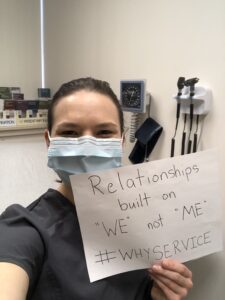
Allison Spraul, a current Precious Blood Volunteer, sharing her reasons for serving
To learn more about serving as a Precious Blood Volunteer go to our website www.preciousbloodvolunteers.org
Feb 9, 2021
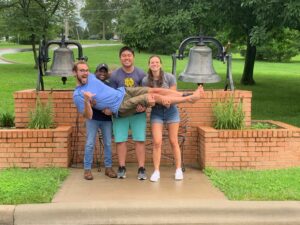
Take a look below at some of our information sessions from this year. You can learn more about Precious Blood Volunteers, postgraduate service, and how you can grow while walking with and learning from others.
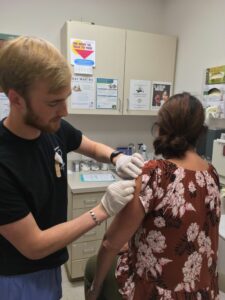






 I want to be a leader whose actions and words align. To me, it speaks of authenticity and of true commitment, and it is easier to ask others to follow when you practice what you preach. I have seen providers I work with be vaccinated and share their personal experiences with patients, and lead healthy lives to model behaviors they encourage in patients. Jesus asks much from his followers, but he also healed the sick, dined with sinners, and eventually died on the cross, proving he is not merely the source of teachings on how to live as a child of God, but also the perfect example to follow for living a holy and moral life every day.
I want to be a leader whose actions and words align. To me, it speaks of authenticity and of true commitment, and it is easier to ask others to follow when you practice what you preach. I have seen providers I work with be vaccinated and share their personal experiences with patients, and lead healthy lives to model behaviors they encourage in patients. Jesus asks much from his followers, but he also healed the sick, dined with sinners, and eventually died on the cross, proving he is not merely the source of teachings on how to live as a child of God, but also the perfect example to follow for living a holy and moral life every day.



